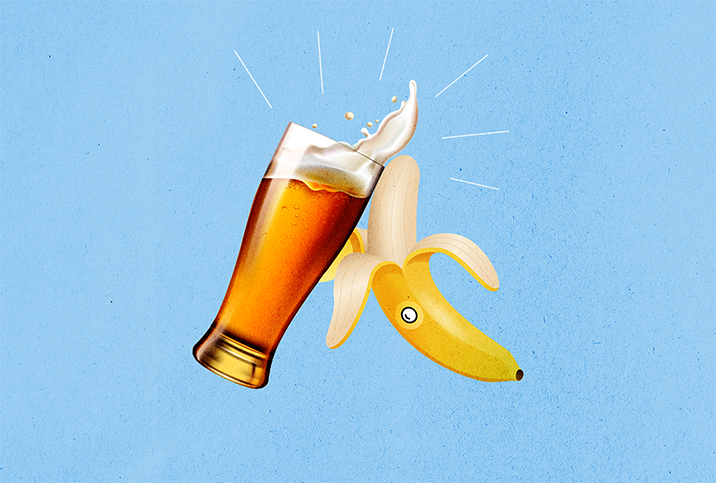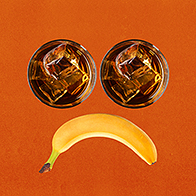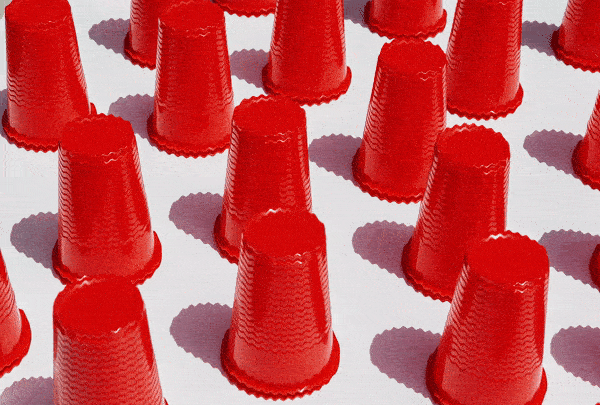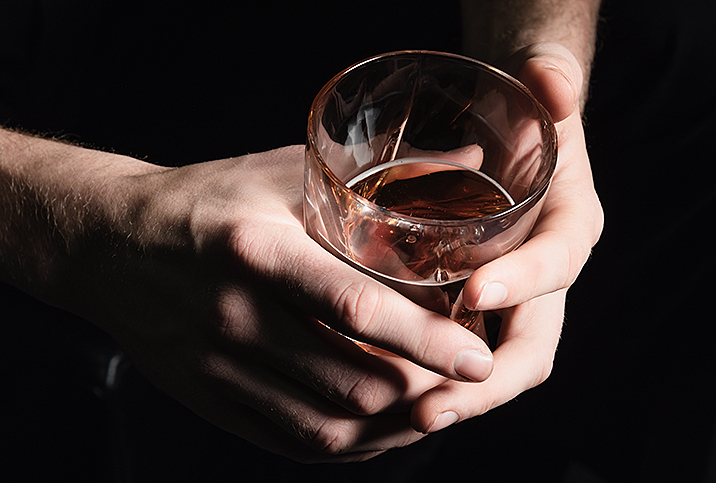Does Booze Ever Have a Place in Bed?

Alcohol and humankind share a long, messy, sloppy-drunk history.
Some scholars suspect people were imbibing alcohol and other psychoactive substances at least 30,000 years ago, as indicated by cave paintings depicting shamanistic rituals. For reference, that's around the time humans invented bread.
Anthropologists believe that thousands of years before we built cities, made bronze or even developed agriculture, our ancestors learned that fruit and berries which accidentally became fermented resulted in something quite special on the happy juice index.
Before long, our forebears took matters into their own hands and became experts at producing all kinds of alcohol. Soon after, no doubt, the first cave-dweller case of "whiskey dick" must have happened, leading to an embarrassed confession along the lines of: "Baby, me swear, this never happen to Glorg before."
Today, we know plenty about the health risks attributed to excessive drinking, including the strong possibility that it may contribute to erectile dysfunction (ED).
Nevertheless, it seems clear that as a species, we love alcohol—maybe as much as we love sex.
So, the hopeful question on the purple-stained lips of many a lustful wine-drinker is this: Are there any circumstances under which drinking can actually be beneficial, particularly when it comes to sexy times with your own cavemate?
A glass a day keeps the doctor away?
It's long been believed that wine in moderation—especially red wine—can be good for your heart.
"There is evidence that says red wine can help heart disease," said Niket Sonpal, M.D., a New York-based internist and gastroenterologist. "There's data that says it helps with HDL cholesterol, lowers your blood pressure, reduces diabetes risk, and helps with stress and anxiety—temporarily."
The reasons behind the heart benefits aren't crystal clear, but theories suggest the antioxidants in red wine may help you to develop HDL cholesterol (the "good" cholesterol) and prevent LDL cholesterol (the "bad" kind) from accumulating.
Another hypothesis suggests it's due to the presence of a particular antioxidant called resveratrol, found in the skin of grapes. Resveratrol is anti-inflammatory, anticarcinogenic and cardioprotective, and helps reduce blood pressure and helps with cholesterol. Yet another theory points to polyphenols, which are specific to wine and may provide cardiovascular protection.
However, some doubters like to dump a sobering, cold shower on these theories, saying the red wine-healthy heart connection is simply a coincidence. Some heart research specialists suggest the same people who regularly drink red wine in moderation may simply live healthier lives overall, eating better and getting more exercise than the general public.
Regardless, this viewpoint often gets swept under the rug, because the key phrase that trips up a lot of people is "in moderation."
"As soon as you go above the 'moderate' category of consumption, it actually worsens your risk," Sonpal said. "As soon as you go from a little to a medium amount, you negate all the effects. Basically, there's no overwhelming study that says, 'This much is good, this much is helpful.' We do know very well that alcohol abuse and overuse will hurt you."
Eight or more drinks per week is considered heavy drinking for women; it's 15 or more drinks per week for men, according to the Centers for Disease Control and Prevention (CDC). Citing "The Dietary Guidelines for Americans," the agency clarified that to fall into the "drinking in moderation" zone, men must limit themselves to two drinks or fewer in a day, and women one drink or fewer in a day.
So, are we gonna talk about sex?
Most adults probably have some experience with alcohol's effects on lowering inhibitions. Of course, that's why we like to gather and drink together with friends and strangers alike: It loosens us up.
The problems come into play when we cross the invisible line between moderate drinking and drinking a little too much—and, crucially, not knowing where that line is.
"It all depends on a person's genetic gender, their weight, their height and a lot of genetic factors," Sonpal said. "There are some people whose livers are better at handling it and some who are not, so it's hard to say."
The bummer is that it really doesn't take much for some of us to cross over to the no-bone zone.
Alcohol can also render you unable to ejaculate at all.
"Two or more drinks in an hour can cause problems with erections," Sonpal said. "And if you already have existing problems with erections, it can lead to significant interference. It can also affect medications you're going to use for erectile dysfunction. It changes the way the medication is absorbed and the amount of the medication that's affecting the patient."
It gets worse: Alcohol can cause premature ejaculation, as well. So even if you manage to drunkenly charm someone into bed and manage to get it up, you might find yourself firing off the ol' cannon long before your friend's ship has set sail. Worse still, alcohol can also render you unable to ejaculate at all.
"It's like William Shakespeare wrote in Macbeth: '[Alcohol] provokes the desire, but it takes away the performance,'" Sonpal said.
Half-full or half-empty?
Everybody's different. Just as we all handle alcohol differently in terms of how quickly we get inebriated, how we behave when we're drinking and how we recover, each of our bodies has its own particular sexual response when we're under the influence.
The key to navigating the line between fun and too much fun may simply be to know your limitations.
"At the end of the day, we just need to pay attention to our bodies," said Amy Pearlman, M.D., a urologist and director of men's health at the University of Iowa. "Whether it's related to alcohol or something we eat or drink, or if we exercise or don't exercise, our bodies tell us what works for us—we just don't pay attention to what our bodies are telling us. So if we drink two glasses of wine and find that we can't perform, then that's too much for us.
"No one wants to hear that anything is OK in moderation," she added. "But it actually may be that simple."




















